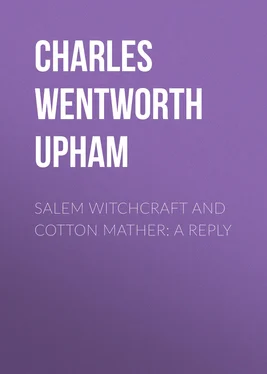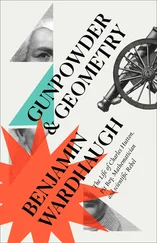Charles Wentworth Upham - Salem Witchcraft and Cotton Mather - A Reply
Здесь есть возможность читать онлайн «Charles Wentworth Upham - Salem Witchcraft and Cotton Mather - A Reply» — ознакомительный отрывок электронной книги совершенно бесплатно, а после прочтения отрывка купить полную версию. В некоторых случаях можно слушать аудио, скачать через торрент в формате fb2 и присутствует краткое содержание. Жанр: foreign_prose, История, foreign_edu, foreign_antique, на английском языке. Описание произведения, (предисловие) а так же отзывы посетителей доступны на портале библиотеки ЛибКат.
- Название:Salem Witchcraft and Cotton Mather: A Reply
- Автор:
- Жанр:
- Год:неизвестен
- ISBN:нет данных
- Рейтинг книги:3 / 5. Голосов: 1
-
Избранное:Добавить в избранное
- Отзывы:
-
Ваша оценка:
- 60
- 1
- 2
- 3
- 4
- 5
Salem Witchcraft and Cotton Mather: A Reply: краткое содержание, описание и аннотация
Предлагаем к чтению аннотацию, описание, краткое содержание или предисловие (зависит от того, что написал сам автор книги «Salem Witchcraft and Cotton Mather: A Reply»). Если вы не нашли необходимую информацию о книге — напишите в комментариях, мы постараемся отыскать её.
Salem Witchcraft and Cotton Mather: A Reply — читать онлайн ознакомительный отрывок
Ниже представлен текст книги, разбитый по страницам. Система сохранения места последней прочитанной страницы, позволяет с удобством читать онлайн бесплатно книгу «Salem Witchcraft and Cotton Mather: A Reply», без необходимости каждый раз заново искать на чём Вы остановились. Поставьте закладку, и сможете в любой момент перейти на страницу, на которой закончили чтение.
Интервал:
Закладка:
His prayers and vigils, which often led to such high wrought and intense experiences, were, not infrequently, brought down to the level of ordinary sublunary affairs. In his Diary, he says, on one occasion: "I set apart the day for fasting with prayer, and the special intention of the day was to obtain deliverance and protection from my enemies. I mentioned their names unto the Lord, who has promised to be my shield." The enemies, here referred to, were political opponents—Governor Dudley and the supporters of his administration.
At another time, he fixed his heart upon some books offered for sale. Not having the means to procure them in the ordinary way, he resorted to prayer: "I could not forbear mentioning my wishes in my prayers, before the Lord, that, in case it might be of service to his interests, he would enable me, in his good Providence, to purchase the treasure now before me. But I left the matter before him, with the profoundest resignation."
The following entry is of a similar character: "This evening, I met with an experience, which it may not be unprofitable for me to remember. I had been, for about a fortnight, vexed with an extraordinary heart-burn; and none of all the common medicines would remove it, though for the present some of them would a little relieve it. At last, it grew so much upon me, that I was ready to faint under it. But, under my fainting pain, this reflection came into my mind. There was this among the sufferings and complaints of my Lord Jesus Christ. My heart was like wax melted in the middle of my bowels. Hereupon, I begged of the Lord, that, for the sake of the heart-burn undergone by my Saviour, I might be delivered from the other and lesser heart-burn wherewith I was now incommoded. Immediately it was darted into my mind, that I had Sir Philip Paris's plaster in my house, which was good for inflammations; and laying the plaster on, I was cured of my malady."
These passages indicate a use of prayer, which, to the extent Mather carried it, would hardly be practised or approved by enlightened Christians of this or any age; although our Reviewer fully endorses it. In reference to Mather's belief in the power of prayer, he expresses himself with a bald simplicity, never equalled even by that Divine. After stating that the Almighty Sovereign was his Father, and had promised to hear and answer his petitions, he goes on to say: "He had often tested this promise, and had found it faithful and sure." One would think, in hearing such a phraseology, he was listening to an agent, vending a patent medicine as an infallible cure, or trying to bring into use a labor-saving machine.
The Reviewer calls me to account for representing "the Goodwin affair" as having had "a very important relation to the Salem troubles," and attempts to controvert that position.
On this point, Francis Hutchinson, before referred to, gives his views, very decidedly, in the following passages: [ Pp. 95, 96, 101. ] "Mr. Cotton Mather, no longer since than 1690, published the case of one Goodwin's children. * * * The book was sent hither to be printed amongst us, and Mr. Baxter recommended it to our people by a Preface, wherein he says: 'That man must be a very obdurate Sadducee that will not believe it.' The year after, Mr. Baxter, perhaps encouraged by Mr. Mather's book, published his own Certainty of the World of Spirits , with another testimony, 'That Mr. Mather's book would Silence any incredulity that pretended to be rational.' And Mr. Mather dispersed Mr. Baxter's book in New England, with the character of it, as a book that was ungainsayable."
Speaking of Mather's book, Doctor Hutchinson proceeds: "The judgment I made of it was, that the poor old woman, being an Irish Papist, and not ready in the signification of English words, had entangled herself by a superstitious belief, and doubtful answers about Saints and Charms; and seeing what advantages Mr. Mather made of it, I was afraid I saw part of the reasons that carried the cause against her. And first it is manifest that Mr. Mather is magnified as having great power over evil spirits. A young man in his family is represented so holy, that the place of his devotions was a certain cure of the young virgin's fits. Then his grandfather's and father's books have gained a testimony, that, upon occasion, may be improved one knows not how far. For amongst the many experiments that were made, Mr. Mather would bring to this young maid, the Bible, the Assembly's Catechism , his grandfather Cotton's Milk for Babes , his father's Remarkable Providences , and a book to prove that there were Witches; and when any of these were offered for her to read in, she would be struck dead, and fall into convulsions. 'These good books,' he says, 'were mortal to her'; and lest the world should be so dull as not to take him right, he adds, 'I hope I have not spoiled the credit of the books, by telling how much the Devil hated them.'"
This language, published by Doctor Hutchinson, in England, during the life-time of the Mathers, shows how strong was the opinion, at that time, that the writings of those two Divines were designed and used to promote the prevalence of the Witchcraft superstition, and especially that such was the effect, as well as the purpose, of Cotton Mather's publication of the case of the Goodwin children, put into such circulation, as it was, by him and Baxter, in both Old and New England. In the same connection, Francis Hutchinson says: "Observe the time of the publication of that book, and of Mr. Baxter's. Mr. Mather's came out in 1690, and Mr. Baxter's the year after; and Mr. Mather's father's Remarkable Providences had been out before that; and, in the year 1692, the frights and fits of the afflicted, and the imprisonment and execution of Witches in New England, made as sad a calamity as a plague or a war. I know that Mr. Mather, in his late Folio, imputes it to the Indian Pawaws sending their spirits amongst them; but I attribute it to Mr. Baxter's book, and his, and his father's, and the false principles, and frightful stories, that filled the people's minds with great fears and dangerous notions."
Our own Hutchinson, in his History of Massachusetts , [ II., 25-27 ] alludes to the excitement of the public mind, occasioned by the case of the Goodwin children. "I have often," he says, "heard persons who were of the neighborhood, speak of the great consternation it occasioned."
In citing this author, in the present discussion, certain facts are always to be borne in mind. One of his sisters was the wife of Cotton Mather's son, towards whom Hutchinson cherished sentiments appropriate to such a near connection, and of which Samuel Mather was, there is no reason to doubt, worthy. In the Preface to his first volume he speaks thus: "I am obliged to no other person more than to my friend and brother, the Reverend Mr. Mather, whose library has been open to me, as it had been before to the Reverend Mr. Prince, who has taken from thence the greatest and most valuable part of what he had collected."
Moreover, this very library was, it can hardly be questioned, that of Cotton Mather; of which, in his Diary, he speaks as "very great." In an interesting article, to which I may refer again, in the Collections of the Massachusetts Historical Society , [ IV., ii., 128 ], we are told that, in the inventory of the estate of Cotton Mather, filed by his Administrator, "not a single book is mentioned among the assets of this eccentric scholar." He had, it is to be presumed, given them all, in his life-time, to his son, who succeeded to his ministry in the North Church, in 1732.
When the delicacy of his relation to the Mather family and the benefit he was deriving from that library are considered, the avoidance, by Hutchinson, of any unpleasant reference to Cotton Mather, by name, is honorable to his feelings. But he maintained, nevertheless, a faithful allegiance to the truth of history, as the following, as well as many other passages, in his invaluable work, strikingly show. They prove that he regarded Mather's "printed account" of the case of the Goodwin children, as having a very important relation to the immediately subsequent delusion in Salem. "The eldest was taken," he says, "into a Minister's family, where at first she behaved orderly, but after some time suddenly fell into her fits." "The account of her sufferings is in print; some things are mentioned as extraordinary, which tumblers are every day taught to perform; others seem more than natural; but it was a time of great credulity. * * * The printed account was published with a Preface by Mr. Baxter. * * * It obtained credit sufficient, together with other preparatives, to dispose the whole country to be easily imposed upon, by the more extensive and more tragical scene, which was presently after acted at Salem and other parts of the county of Essex." After mentioning several works published in England, containing " witch-stories ," witch-trials, etc., he proceeds: "All these books were in New England, and the conformity between the behavior of Goodwin's children, and most of the supposed be-witched at Salem, and the behavior of those in England, is so exact, as to leave no room to doubt the stories had been read by the New England persons themselves, or had been told to them by others who had read them. Indeed this conformity, instead of giving suspicion, was urged in confirmation of the truth of both. The Old England demons and the New being so much alike."
Читать дальшеИнтервал:
Закладка:
Похожие книги на «Salem Witchcraft and Cotton Mather: A Reply»
Представляем Вашему вниманию похожие книги на «Salem Witchcraft and Cotton Mather: A Reply» списком для выбора. Мы отобрали схожую по названию и смыслу литературу в надежде предоставить читателям больше вариантов отыскать новые, интересные, ещё непрочитанные произведения.
Обсуждение, отзывы о книге «Salem Witchcraft and Cotton Mather: A Reply» и просто собственные мнения читателей. Оставьте ваши комментарии, напишите, что Вы думаете о произведении, его смысле или главных героях. Укажите что конкретно понравилось, а что нет, и почему Вы так считаете.












